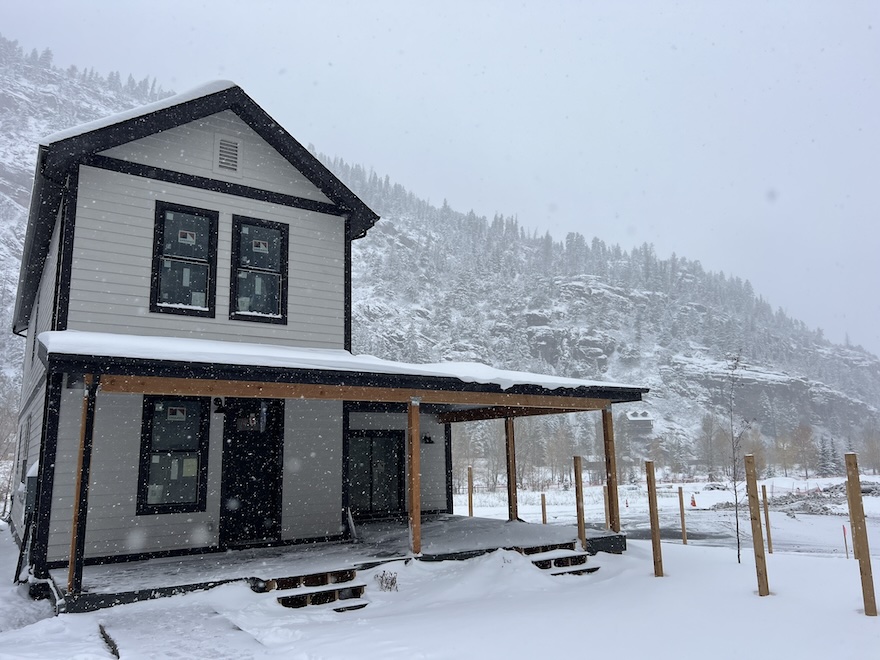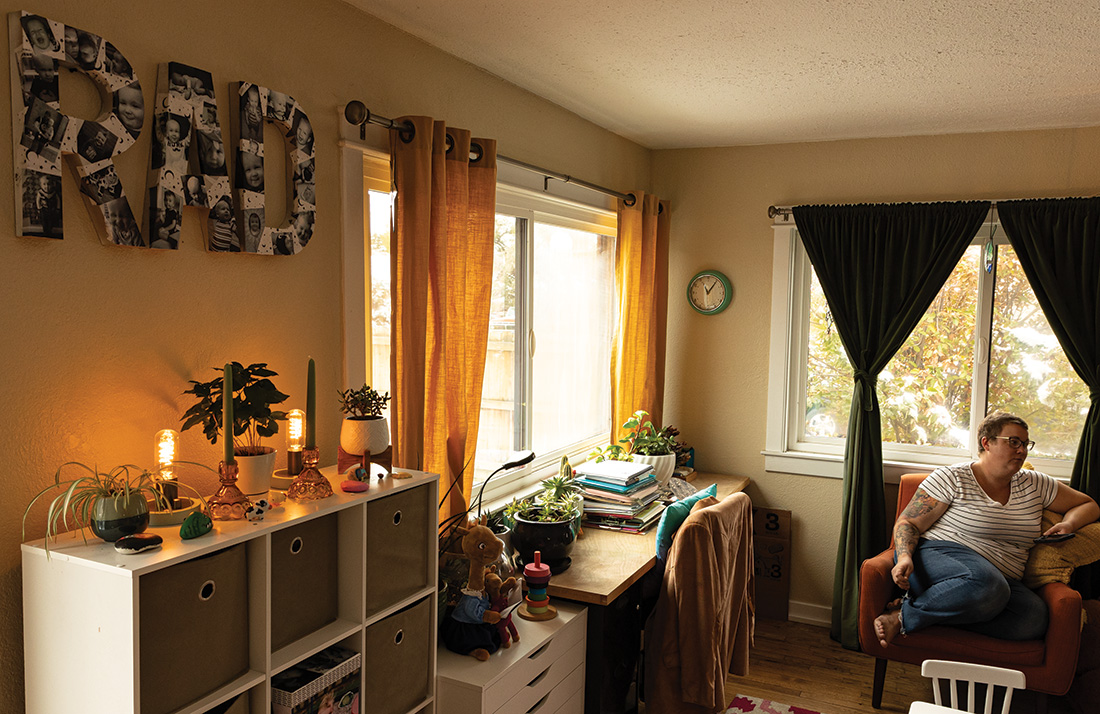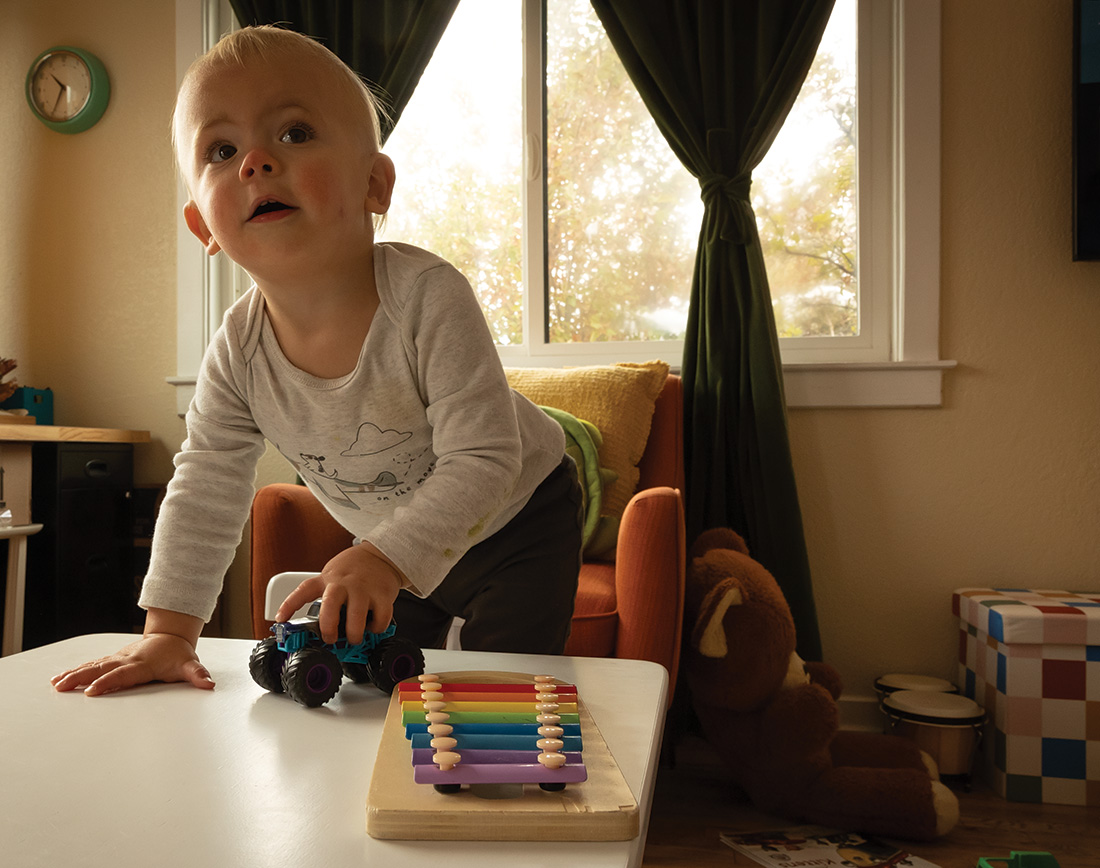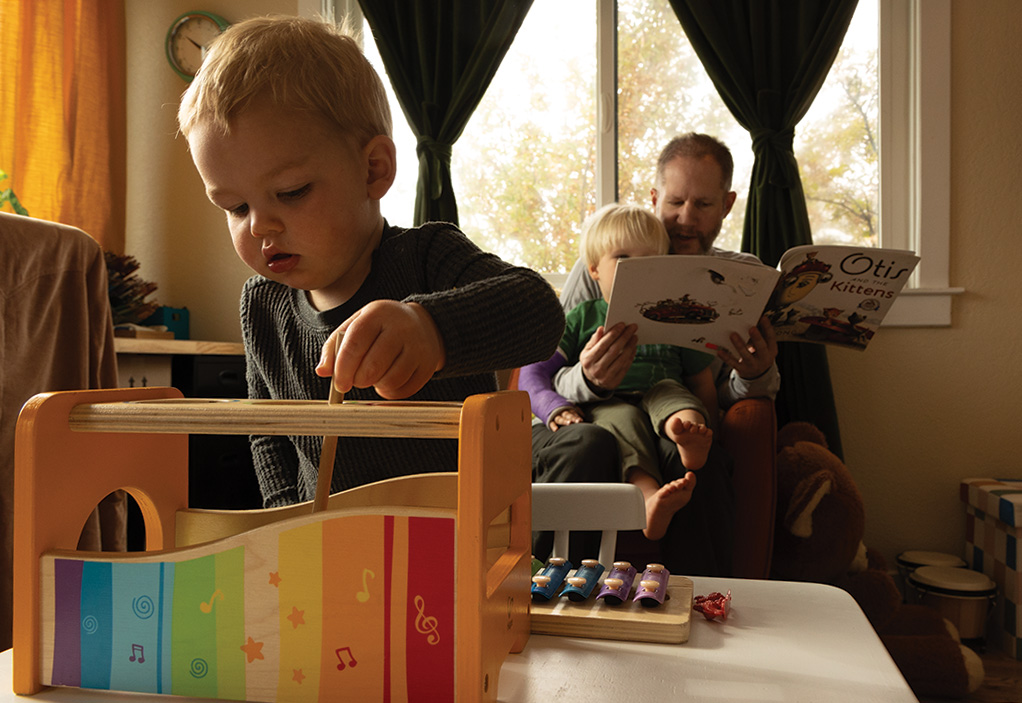In a first for Ouray County — and maybe the country — the Waterview affordable housing development will attempt to solve two problems under one roof.
The first of those problems is providing an affordable path to homeownership. But the second problem – a lack of available child care in the community – is also part of the goal of Waterview.
In January, Melissa McChristian will open her first licensed home-based daycare business, moving her family into an affordable home and bringing an essential service to the community.
Child care provider Melissa McChristian and her family are moving to the Waterview affordable housing project in Ouray where she will open one of two in-home day cares. She’s pictured here with her partner, Daniel Pittman, and their 2-year-old son, Rupert. The pilot project is the county’s first example of a mixed-use solution to address both the affordable housing crisis and child care shortage.
Erin McIntyre — Ouray County Plaindealer
McChristian, 39, will open one of two home-based day cares in the Waterview Homes affordable housing project in Ouray, which also includes 19 more affordable homes in its first phase. The houses designed for home-based day care are specially designed to house providers and their businesses as a solution to the child care shortage.
McChristian, who had been nannying in Ridgway full-time since 2016, saw the county’s child care problem balloon a few years ago as she fielded requests from families left and right.
“It just felt like I cannot be the only provider,” she said.
Rural Homes, an affordable housing nonprofit, and Bright Futures, an Early Childhood Council based in Telluride, combined efforts a couple of years ago to design a mixedused pilot project to solve two shortages — affordable housing and childcare — at once.
McChristian and Estrella Piatt, who is opening the other in-home child care, will each begin with a four-child capacity which can eventually expand to 12 slots each, quadrupling the current amount of licensed home-based licensed daycare slots in Ouray County.
How it started
The collaboration between Rural Homes and Bright Futures arose from an existing working relationship and good timing, said Kathleen Merritt, executive director of Bright Futures.
At the same time Bright Futures finished a community survey demonstrating an acute need for child care in Ouray County, Rural Homes was wrapping up its plans for an affordable housing development in Ridgway with another 21-home project on the horizon in Ouray.
Bright Futures’ child care survey conducted in partnership with Ouray County and Community Early Childhood Workgroup in the spring of 2022 found that 80% of 56 Ouray County families with children younger than 6 said their current child care didn’t meet their needs. They cited reasons ranging from high costs to needing to drive their children to Montrose for available spots.
At the time the survey was conducted Katrina Thomsen was, and remains, the county’s only licensed in-home child care provider, with a six-child capacity in Ridgway.
The county has three other licensed child care centers: Early Learning Center of Ouray within the Ouray School District, Ridgway School District Preschool and Voyager Youth Program in Ridgway.
But the 2022 survey found that for the county’s 158 children younger than 5, there were only 55 available childcare slots, resulting in a 45% deficit.
That deficit, families reported, barred parents from re-entering the workforce, made them think twice about having more kids and, paired with the challenge of affordable housing, even resulted in the need to relocate out of the county entirely.
How it came together
The concept for the Waterview project is simple enough: If you build more affordable family housing without addressing the existing child care shortage, you’re only exacerbating the problem, according to Rural Homes Operations Manager Sheamus Croke.
In response, Rural Homes incorporated two units designed to qualify as licensed family child care homes for its Waterview affordable housing project and began formulating a home-purchase plan for the providers.
Because Rural Homes builds purchasable rather than rentable homes — something out of reach for many new business owners — a nonprofit organization called Mission Driven Finance purchased the child care-ready homes to be rented by the providers, Croke said.
The rent will begin at a lower rate initially, scaling up to 100% of the area-median income allowed for a four-bedroom home, Croke said. After two years, McChristian and Piatt have the option to purchase the homes. Each of the three-bedroom homes — considered four-bedroom because of the child care area – were sold to Mission Driven Finance for $479,000 each. Croke said they were the most subsidized component of the Waterview project, and would likely be two or three times that value on the free market.

This photo shows the exterior of one of two homes built specifically for licensed, in-home day care in the Rural Homes’ Waterview affordable housing project north of Ouray. The homes are expected to be finished soon, ready for families to move in sometime in December.
Lia Salvatierra – Ouray County Plaindealer
“In reality, we would never be able to have this opportunity to buy a house in Ouray, much less probably even a new house,” McChristian said. “You know, everything’s just so overpriced. So owning a home is within our reach now.”
With Rural Homes focusing on the child care ready units, Bright Futures’ role in the project was to help prospective providers learn the business of owning their own day cares.
Curriculum for the family child care business accelerator cohort came from a nonprofit organization called All Our Kin.
“We have a very close relationship with the state who had adopted this All Our Kin business series specific to family child care home providers in an effort to really professionalize the industry and give them the business tools they need,” Merritt said.
For McChristian, who attended every community meeting held by the nonprofits to discuss the pilot model, things started to feel real when the cohort program rolled out about a year ago.
It was a big push to ensure sufficient outreach, Croke said. Both groups canvassed online, in both English and Spanish, and even visited college campuses. The cohort program was available to all interested providers, regardless of their intent to move into the Waterview homes.
After months of outreach, the free cohort program had six prospective providers on its roster, from those working in schools to directors of day cares to babysitters.
The cohort program ran once a week for three hours in the evening from April until August.
When the course ended, only three people remained, from which only Mc-Christian and Piatt were able to relocate to Ouray County, Merritt said. The third prospective provider was based in Denver.
“It was a good process in the sense that … the providers got more and more knowledge about what this would entail, and the rigors of starting your own business,” Croke said. “It kind of self-selected providers who are the people who are really in this for the long haul.”
Though there were only two eligible providers able to relocate at the end of the cohort program and two Waterview slots, both McChristian and Piatt still went through the final selection process by presenting business plans and completing interviews to secure their spots.
McChristian said though she initially went into the cohort program guarded, worried things might not come to fruition or be a good fit, it became clear about halfway through the process that she could make it happen.
“I felt safe and secure to put my hopes and dreams and invest, you know,” she said “I was at the point where I felt like we can get excited now.”
From nanny to starting her own business
McChristian and her partner, Daniel Pittman, originally came to Montrose from Texas in 2016 for a fresh start after losing their son, Radley, to cancer.

Childcare provider Melissa McChristian sits in the living room of her rented home in Montrose. She’s moving to a new home in Ouray soon, in the Waterview affordable housing project, and will be one of two licensed in-home daycare providers.
Erin McIntyre – Ouray County Plaindealer
After her nearly 3-year-old son died, McChristian wasn’t sure she would be able to work so closely with children again. But she actually found spending time with them healing. So she returned to the world of childcare as a full-time nanny, which she has now been doing for more than 15 years.
Once McChristian began the Bright Futures cohort program, the chance to run a trial in-home day care fell into her lap. Over the summer she received multiple requests from families who were seeking only a few days of childcare for their boys, all younger than 4.
So McChristian asked her landlord for permission, switched gears from a fulltime nannying gig and opened what the state considers a license-exempt child care facility. She is limited to providing less than 24-hours of care and can only care for four children at a time, with no more than two younger than 2.
What got her really excited about the Waterview opportunity was the potential of opening a full-fledged business.
“I think halfway through, when I started talking more about the business … and running it, I guess it kind of lit a fire,” she said. “Yeah, I do kind of want to see if I can run my own business. I want to have a woman-owned business and see if I can do something I never imagined being able to do.”
On top of nannying, McChristian holds a bachelor’s degree in fine arts and has designed and sold a variety of artwork, like this year’s Ridgway Independent Film Festival logo and a mural for Chow Down Pet Supplies in Montrose.
But the day care will be her first registered business, and the Bright Futures’ business cohort program made her feel supported enough to take it on, she said.
Leaning in to care, creativity
McChristian described both her affinity for kids and her style of care as organic.
At her current day care, she rotates care for six children and her own 2-year-old son, Rupert. She can watch four kids at a time, including him.
She understands each of the kids’ unique habits and emotions, and moves among them effortlessly.
“We’re hanging out, working on our emotions,” she said. “We’re being creative, we’re playing, we make food together. We’re cleaning together, spending time in nature together.”
“And I like to challenge, challenge the little brains and just get them thinking differently about basic stuff,” she added.

Grady Walker, who is 16 months old, plays at Melissa McChristian’s home in Montrose. Walker is one of six children she cares for throughout the week. With more than 15 years of child care experience, McChristian is excited to open her first registered, licensed child care business out of her home in the affordable Waterview housing project. She and another child care provider will eventually quadruple the capacity of in-home licensed day care slots in Ouray County, where there is currently only one licensed in-home childcare provider. Erin McIntyre — Ouray County Plaindealer
But she said it all comes down to being a welcoming community child care center. She plans on covering one of the walls in a mural, which she plans on having the kids help create.
“And I think the goal for the center, the one that I’m going to open, is to really lean into creativity… and [being] all inclusive, just welcoming and learning about each other and each other’s cultures and lives and going on adventures,” she said.

Two-year-old Boone McCracken plays at Melissa McChristian’s house in Montrose, where she currently runs an unlicensed daycare out of her home. In the background, McChristian’s partner, Daniel Pittman, reads a book to their son, Rupert, age 2. McChristian currently cares for up to four children at a time in her home, but will be starting her official licensed in-home day care in Ouray in January as part of the Waterview affordable housing project’s childcare initiative.
Erin McIntyre — Ouray County Plaindealer
Plans for opening
Once she opens in January, McChristian will be a license-exempt provider until the state completes its licensing process, which Merritt estimates will happen after 30 days of occupying the home. At that point, she can care for up to six children at a time.
Eventually, she plans to bring Pittman on as a teaching assistant to care for up to 12 children in the space. Pittman, who currently works as a production coordinator for a manufacturer in Montrose, also plans to help with administrative and bookkeeping work.
McChristian is worried about not being able to provide her service to everyone who needs it, but said it will all boil down to logistics of having the right combination of ages and genders. She plans on caring for children younger than 4.
Piatt, who is opening the other childcare business, plans to take on children ages 3 to 6.
“Hopefully it’ll be enough. And, I mean, yeah, it’s gonna be hard to not be able to provide for everybody,” McChristian said.
Both new entrepreneurs are in regular communication, sharing resources and coordinating orders to get their business outfitted. Rural Homes is purchasing $25,000 of start-up equipment through a grant for each of them.
Bright Futures will remain in frequent contact with the providers and Rural Homes will check in with the providers quarterly. Common Good Consulting will complete a yearlong formal study of the pilot model.
Croke, operations manager for Rural Homes, emphasized this is a test run and if things don’t go as planned, they will re-evaluate and try to make them work.
“I don’t want to saddle our two selected providers with helping solve the childcare crisis in Ouray, you know,” he said. “It’s a bigger problem than that.”
Lia Salvatierra is a journalist with Report for America, a service program that helps boost underserved areas with more reporting resources.

